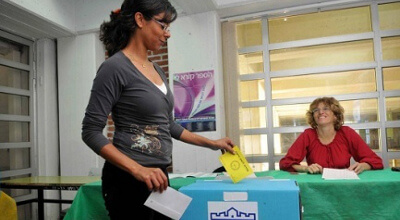Nearly 40 percent of Israeli women are still unsure which party they are going to vote for, leaving the coming election results still rather open, a poll released by Saloona, a women’s website, revealed on Monday.
Still, more than three-quarters (76 percent) of the women polled said they had definite plans to cast ballots in the upcoming elections, reflecting Israel’s relatively high voter turnout in comparison to other Western nations. Only 3 percent said they were definitely not voting.
Of those women who are opting to relinquish their electoral privileges, the highest percentage (25 percent) said it was because there was no party convincing enough for which to vote. Other reasons for staying away from the polls included the notion that all the parties were more or less the same (21 percent) and not knowing which party to choose (17 percent).
Of the 34 parties running for the Knesset in the elections on Jan. 22, the right-wing Strong Israel Party, haredi Am Shalem Party and Tzipi Livnis’ Hatnuah Party are yielding the greatest deliberation among voters. Fifty percent of the women voting for these parties were still on the fence about whether or not they had solidified their loyalty.
The haredi Shas Party, Labor and Meretz had the strongest loyalty among women voters, with 14 percent of Shas voters saying they were secure in their choice, and 18 percent of voters for the last two parties pledging allegiance.
Still, if the elections were to take place tomorrow, Likud-Beytenu would take a strong lead with 34 Knesset seats, followed by Labor (18 seats), national-religious Habayit Hayehudi (14 seats) and Yair Lapid’s Yesh Atid Party (11 seats). Arab rights party Balad, the anti-corruption Eretz Chadasha and Am Shalem all took the fewest amount of seats to pass the threshold at two apiece.
As for the Right and Center-Left blocs, according to the Saloona poll the former would garner 63 seats, while the latter would get 57 seats.















































